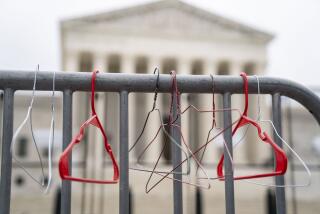Questions About These Questions : Value of Senate questionnaire and the motives involved it are suspect
- Share via
Lawmakers must sometimes spend money to identify areas for greater budgetary savings, but the efforts of one Senate subcommittee promise to be wasteful and silly.
All 778 federal district and circuit court judges have now received a detailed questionnaire from the subcommittee on administrative oversight and the courts. The survey asks dozens of questions on each judge’s workload, circuit activities, outside work activities and office space.
The subcommittee chairman, Sen. Charles E. Grassley (R-Iowa), who is spearheading the survey, says he wants to identify duplication and excess capacity in the federal judiciary. Fair enough. He also hopes the survey will “begin a dialogue” with the federal courts about cost-efficiency. But given the way he has gone about it, a monologue is a more likely result.
Grassley’s questions are so broad they undoubtedly will elicit answers far too general to be of much use in budgeting. Examples: “What is your perception of your court’s caseload and backlog?” and “Do you feel that the current number of judges in your circuit or district is conducive to collegiality?” Some answers aim at information routinely collected by the Administrative Office of the Courts.
If most federal judges respond, the cost, in terms of their time, will be significant. If few do--response is voluntary and some judges have already indicated they will not answer--the data collected will be of little value.
Moreover, Grassley’s stated budgetary goals are clouded by his apparent interest in a specific outcome, reducing the number of judges on some federal courts, particularly the Circuit Court of Appeals for the District of Columbia. One seat on that circuit court has been vacant now for more than two years. Grassley opposed President Clinton’s nominee for that post, Merrick Garland, but following Judiciary Committee approval, Garland’s nomination is now before the full Senate. Defunding the open seat on the bench would, of course, kill the nomination.
Though the Constitution established the courts as an independent, equal branch of a tripartite government, Congress of course has a legitimate interest in learning more about how the courts spend congressionally appropriated money. That responsibility, however, is not a license to waste taxpayer money and judges’ time.
More to Read
Get the L.A. Times Politics newsletter
Deeply reported insights into legislation, politics and policy from Sacramento, Washington and beyond. In your inbox twice per week.
You may occasionally receive promotional content from the Los Angeles Times.










